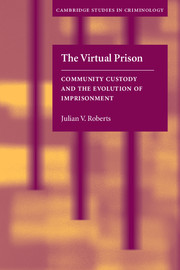Book contents
- Frontmatter
- Contents
- List of figures and tables
- Foreword by Andrew Ashworth
- Preface
- 1 Introduction to the concept of community custody
- 2 The way we punish now
- 3 Conceptualizing community custody
- 4 Representative models of community custody
- 5 Coming home to prison: offender perceptions and experiences
- 6 The effect of community custody on prison admissions
- 7 Public attitudes to community custody
- 8 Making community custody sentences work
- Notes
- References
- Index
Foreword by Andrew Ashworth
Published online by Cambridge University Press: 07 December 2009
- Frontmatter
- Contents
- List of figures and tables
- Foreword by Andrew Ashworth
- Preface
- 1 Introduction to the concept of community custody
- 2 The way we punish now
- 3 Conceptualizing community custody
- 4 Representative models of community custody
- 5 Coming home to prison: offender perceptions and experiences
- 6 The effect of community custody on prison admissions
- 7 Public attitudes to community custody
- 8 Making community custody sentences work
- Notes
- References
- Index
Summary
The dominance of imprisonment in many Western penal systems is well known. Some governments have tried to bring about reductions in the use of imprisonment by introducing alternative sanctions, but successes in this endeavour have been relatively rare. Criminologists have analysed the causes of the frequent failures of efforts to reduce reliance on imprisonment, and are ready to raise doubts about the prospects of new initiatives of this kind. This study, however, is different. It discusses an alternative form of sentence that was designed to reduce reliance on imprisonment and appears to have done so, and this gives Julian Roberts the opportunity to explore the conditions for success and methods of avoiding the route to failure.
The measure that is the focus of this study does not have a single name internationally, even though variations of it have been tried in several different jurisdictions. In Canada it is called a conditional sentence of imprisonment, whereas in other jurisdictions it is referred to as home detention, home confinement, or some other term. What it involves, usually, is a sentence placing an offender under curfew in his or her home for certain hours of the day and/or at weekends. In certain cases ‘absolute house arrest’ is a condition, and the offender is confined at home at all times except for a very limited number of court-authorized absences. The sanction is enforced by random checks by probation officers, or through the use of electronic monitoring.
- Type
- Chapter
- Information
- The Virtual PrisonCommunity Custody and the Evolution of Imprisonment, pp. x - xiiPublisher: Cambridge University PressPrint publication year: 2004



